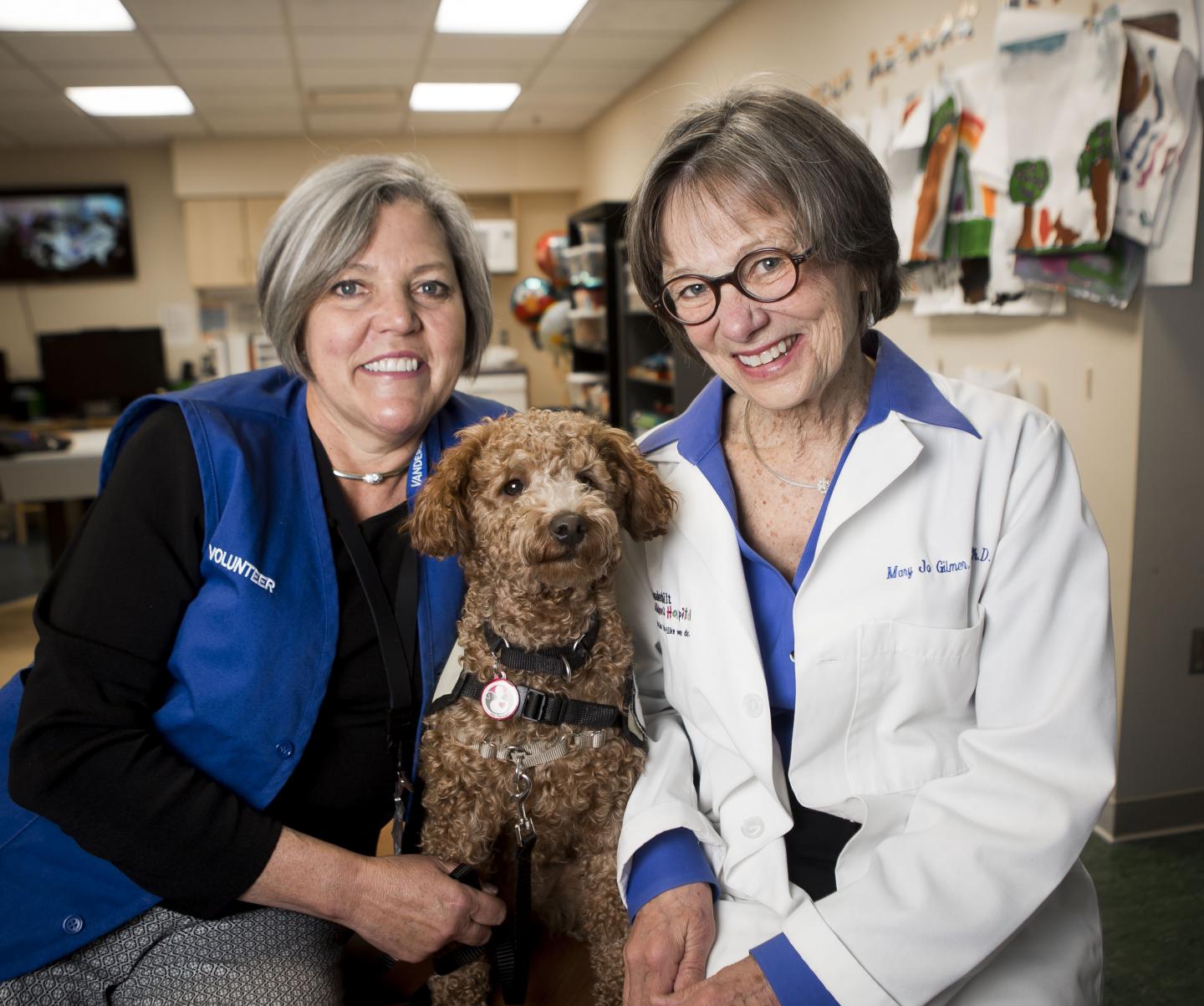
Credit: Susan Urmy/Vanderbilt
The sight of a dog in a therapy vest trotting down a hospital hallway or being petted by a child lying in a hospital bed is familiar to many, yet the scientific research showing the impact of therapy animals is largely anecdotal, says Vanderbilt University School of Nursing Professor Mary Jo Gilmer, PhD, FAAN. Her work is changing that.
Gilmer studies the impact animals can have on children with life-threatening conditions. She recently received a grant from nonprofit Human Animal Bond Research Institute (HABRI) for a pilot program investigating the health benefits of human-animal interactions (HAIs) in reducing suffering of children with cancer undergoing debilitating treatments.
“In this carefully designed research, we are evaluating the effects of human-animal interactions on reducing anxiety, depression, worry and pain, and increasing quality of life in children with advanced cancer, as well as their parents,” Gilmer said. “The goal is to obtain strong data to support the positive health benefits of HAIs in decreasing suffering of children, particularly those diagnosed with advanced cancer.”
For the study, children are randomly assigned to a group receiving usual care or a group receiving usual care plus HAI. The human-animal interactions include interfacing with a therapy dog registered with Pet Partners, a national organization with strict standards that promote health and wellness benefits of HAI.
Then a registered canine team visits for 10-15 minutes during each child’s potentially anxiety-producing hospital or clinic appointments, which occur approximately every week. After being introduced to the dog, the child and parents participate in activities such as petting the dog, taking it on a walk or teaching it new tricks.
Children and their parents or guardians complete measures of stress/anxiety, depression and quality of life at the start of the project and then at every interaction for three months.
“During the course of treatment, children with cancer may experience a variety of threats to their quality of life. Impaired communication, anxiety and stress, long-term hospitalization and isolation affect children’s psychological well-being,” Gilmer said. “Frequently, they experience pain, dyspnea, nausea, drowsiness and fatigue. The complexity of these factors compound the already difficult task children face in effectively coping with their disease. There’s a critical need for novel, yet rigorous research that can mitigate physical distress and improve quality of life for these children with serious illnesses.”
Gilmer believes that the study’s results will provide a strong foundation for full-scale testing of human-animal interventions among children receiving treatment for cancer; the results will also identify characteristics of those most likely to benefit.
The study builds off Gilmer’s previous research, which showed the benefit of human-animal interactions on children newly diagnosed with cancer and their parents. That study, published in the Journal of Pediatric Oncology Nursing, showed that regular visits from a therapy dog contributed to positive psychosocial benefits to families of children during the initial stages of pediatric cancer treatment.
“HABRI is proud to be supporting research focused on the potential for human-animal interactions to benefit children with an advanced disease and their families,” said Steven Feldman, Executive Director of HABRI. “HABRI hopes that the results of this study will build on existing science that demonstrates that interaction with companion animals can aid in the healing process, and serve as a valuable tool for alleviating anxiety and stress for these deserving patients and their families.”
###
The Human Animal Bond Research Institute (HABRI) is a not-for-profit organization that maintains the world’s largest online library of human-animal bond research and information; funds innovative research projects to scientifically document the health benefits of companion animals; and informs the public about human-animal bond research and the beneficial role of companion animals in society. For more information about HABRI, visit http://www.
Media Contact
Craig Boerner
[email protected]




